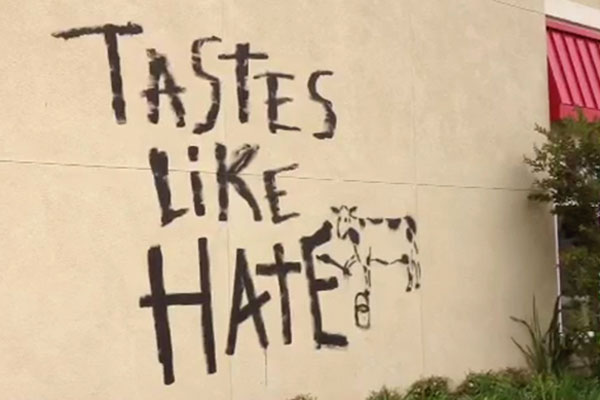Toward a More Civil Union on Marriage
Jennifer Marshall /
Yesterday’s shooting at the Washington, D.C., headquarters of the Family Research Council (FRC) stunned the nation. FRC’s long-time security guard, Leo Johnson, was shot in the arm by a gunman carrying a box of ammunition in his backpack trying to gain access to the building. Law enforcement hailed Leo a hero for his role in tackling and disarming the shooter, and reports today suggest Leo is recovering well from surgery. (Full disclosure: I worked at FRC between 1994 and 2002, and Leo’s warm greeting has always been a highlight of return visits.)
Leaders across the political spectrum have condemned the violent act, from conservative allies of FRC to Republican presidential candidate Mitt Romney to President Obama, the Human Rights Campaign, two dozen other LGBT organizations, and the DC Center for the LGBT Community where the shooter reportedly volunteered. The near-universal condemnation (the exceptions seem to fester in the backwaters of the Twittersphere) is a very welcome sign.
In eschewing such violence, we fortify our resolve to live peacefully with our deepest differences and to pursue consensus about societal norms through politics. Broadly speaking, politics isn’t just the electoral mechanics we typically think of. It’s how we conduct our life together as a people. It relies on debate, persuasion, negotiation…and tolerance. It demands that we communicate, especially when it comes to differences about deeply held beliefs, about the merits of our ideas.
While such resolve is fresh in the mind, this is a critical juncture for reflecting on the character of our political discourse over issues related to sexuality and marriage. We await a likely announcement this fall from the U.S. Supreme Court that it will take up cases involving marriage, following what has turned out to be a very hot summer of intolerance toward traditional views of marriage.
Since June, scorching backlash has been directed at the author of a peer-reviewed study that shows some negative outcomes for young adults whose parents had same-sex relationships. Such findings conflict with an assertion in Judge Vaughn Walker’s opinion overturning California’s marriage amendment, known as Proposition 8, that there is no difference between children of same-sex parents and their peers raised in married mother-and-father households.
Mark Regnerus’s New Family Structures Study improves on prior research through its use of a large, nationally representative sample, as three expert reviews published in the same journal acknowledge. Demographer Cynthia Osborne, for example, says that “the Regnerus study is more scientifically rigorous than most of the other studies in this area.”
That didn’t stop the Human Rights Campaign (HRC) and the Gay and Lesbian Alliance against Defamation (GLAAD) from denouncing the study as a “flawed, misleading, and scientifically unsound paper that seeks to disparage lesbian and gay parents.” Another source wrote off the study as “dangerous propaganda.” An assistant editor at The New Republic called Regnerus a “retrograde researcher” and suggested that this study should “mark the beginning of the end of Mark Regnerus’s credibility with respectable news outlets.”
Allegations from an activist blogger triggered a scientific misconduct inquiry into Regnerus’s work at the University of Texas. The editor of the sociological journal that published the study got such intensely hostile responses that he decided to resort to an internal audit to show the integrity of the publication process.
Then came the Chick-fil-A flap in July. When Dan Cathy, president and COO of the privately held company, made comments in a press interview supporting the “biblical definition of the family unit,” big city politicians from Boston to Chicago to San Francisco threatened to bar the chicken franchise from their communities. Chicago Alderman Joe Moreno announced: “Because of [Cathy’s] ignorance, I will now be denying Chick-fil-A’s permit to open a restaurant in the 1st Ward.”
That runs directly afoul of the First Amendment. A government official may not deny a business license because he doesn’t like things that the applicant has said, as my colleague John Malcolm explained in a recent post. As long as they abide by the law, writes Malcolm, “the owners of Chick-fil-A are well within their rights to say what they want and to put into effect their professed desire to operate Chick-fil-A based ‘on biblical principles.'” Based on the enormous response to Chick-fil-A appreciation day, many Americans would like the company to keep doing just that.
But the brutal summer lumbers on, and two days ago, the Human Rights Campaign ran a blog titled “Paul Ryan Speaking at Hate Group’s Annual Conference“—referring to FRC’s Values Voter Summit. As the blog explains, “FRC has been labeled a hate group by the Southern Poverty Law Center.” The post remains, jarringly, four entries down from the Joint Statement from LGBT Organizations on FRC Shooting.
As my colleague Tom Messner has written, “This is not ‘live and let live.'” These and other episodes fall far short of the tolerance that should characterize public life in America where we enjoy freedom of speech, freedom of religion, and freedom of association.
Given the magnitude of the policy questions at hand in our nation’s great ongoing marriage debate, we should encourage more research and dialogue in this area. To marginalize as illegitimate those whose research contributions or statements might support maintaining the institution of marriage as a union of one man and one woman is a disservice to public discourse and social harmony. (By the way, this includes a majority of voters in the 32 states where the question has been put to them.) Even before the FRC shooting, this summer’s string of uncivil responses falls far short of the tolerant discourse we’ll need to navigate the deep and widespread differences on this issue.
It’s good that we can all agree that waving a gun and yelling “I don’t like your politics” sabotages the very definition of politics. Now let’s agree that supporting traditional marriage isn’t cause for shunning from civil discourse and the public square.

